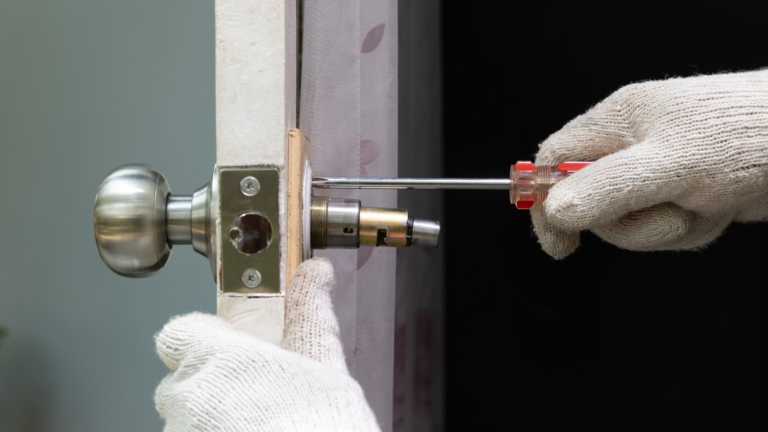While locks are crucial for home security, they can have problems that affect their performance. Ensuring these issues are fixed promptly is essential for continued safety. Here, we analyze frequent lock issues, presenting detailed insights and additional solutions to maintain your locks in excellent condition.
Difficult-to-Turn Locks That Stick
Causes
Lock malfunctions are primarily caused by debris accumulation, rust formation, and worn internal components. Over time, dust, dirt, and other debris can accumulate inside the lock mechanism, obstructing its function. Due to moisture exposure, older locks or ones that are outside are more likely to rust. Lock problems can also be caused by internal component wear and tear from continuous use.
Detailed Solutions
Disassemble the lock if you feel confident in the process, and thoroughly clean the internal components with a gentle brush and an appropriate cleaner to remove built-up debris and old lubricant. For effective maintenance, ensure regular lubrication of locks and keep the area around them clean to stop debris from entering.
Misaligned Lock Mechanisms and Striker Plates
Causes
As buildings age, structural settling can lead to shifts in doors and frames. In addition, changes in weather can cause materials to expand and contract, which could lead to misaligned doors and frames.
Detailed Solutions
Start by tightening the hinges with a screwdriver and adjusting shims as necessary to realign the door. If the latch doesn’t align with the strike plate, remove and reinstall it in the correct position, possibly needing to chisel out new space. In addition, weather stripping should be updated or replaced to ensure that the door fits snugly into its frame, runs smoothly, and prevent future misalignment issues.
Keys that Are Broken
Causes
Keys develop weak points over time, especially through frequent use or exposure to force, potentially compromising their integrity. Furthermore, repeated use results in metal wear and tear, enhancing the risk of breakage.
Detailed Solutions
Start by using a key extractor tool or a small jigsaw blade to carefully catch and pull out the broken piece from the lock. It’s a good practice to inspect keys for wear regularly and get duplicates made before they become too worn. Avoid using heavily worn keys to prevent breakage. If you struggle to remove the broken key, consider seeking assistance from a locksmith who can safely extract it using specialized tools.
Wobbly or Loose Lock Mechanisms
Causes
Locks in areas with a lot of foot traffic tend to become loose because they’re used so often, which wears down their mechanisms over time. Inadequate lock installation can also lead to loose locks over time if the locks were not initially firmly attached.
Detailed Solutions
Start by removing the cover and tightening all visible screws to ensure the lock continues to work properly. Ensure the lock mechanism is securely in the door. Moreover, should worn-out parts be noticed, replacing the entire lock mechanism may be essential to uphold its effectiveness.
Need a locksmith? Don't Worry!
Our expert locksmiths are available 24/7. We're here to help with all your emergency lock needs. Don't hesitate, call us now!
Key Won’t Insert Fully
Causes
Foreign items or debris have the potential to block the keyway, which disrupts the smooth operation of the lock. Additionally, a bent or damaged key might hinder full insertion, compromising the lock’s functionality. To maintain smooth key operation and ensure lock security, both issues require prompt attention.
Detailed Solutions
To maintain your lock’s functionality, start by using a thin, non-metallic tool to clear debris from the keyway. Afterwards, inspect the key for bends or damage, replacing it with a new key as needed to avoid complications. If the problem continues, you may need to get in touch with knowledgeable residential locksmiths in Brunswick, OH who can carefully examine and clean the interior parts of the lock for maximum security and performance.
Lock is Frozen
Causes
Operational issues may arise when moisture inside a lock freezes due to dropping temperatures. Locks may freeze and lose some of their functionality if they are not adequately weatherproofed and are exposed to harsh weather. Adequate protection from the elements is essential to prevent locks from freezing due to moisture buildup.
Detailed Solutions
Apply a lock de-icer spray with alcohol or similar substances to thaw a frozen lock without delay. Before the winter weather arrives, lubricate the surface to keep moisture out and apply a lock cover to shield it from inclement weather. If the lock stays frozen, carefully warm the key with warm water or a lighter before inserting it to melt the ice inside the lock.
Ensuring locks remain secure and functional involves promptly addressing common issues and recognizing when professional help is needed. Proper upkeep, appropriate upgrades, and routine maintenance are essential to preserving the integrity and dependability of your home’s locking systems.
Should you encounter issues with your home’s locks and are struggling to find a solution, consider contacting residential locksmiths in Brunswick, OH. Our experience and specialized tools enable us to handle various lock-related issues, enhancing property security and offering reassurance. Call us today without hesitation!

